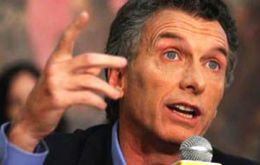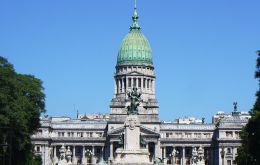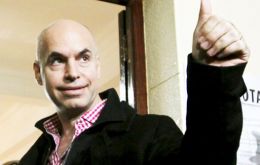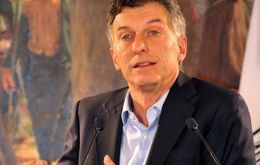MercoPress. South Atlantic News Agency
Tag: Pro Party
-
Wednesday, October 14th 2015 - 07:26 UTC
Macri believes an anti-Kirchner front would have doomed his runoff chances

Argentine presidential candidate Mauricio Macri who is running second in opinion polls, defended not having reached an agreement with the Renewal Front's Sergio Massa, (third in the polls) because otherwise incumbent Daniel Scioli would have reached 45% of vote intention which seals any chance of a runoff a month later.
-
Wednesday, October 14th 2015 - 07:10 UTC
If Scioli is Argentina' next president he should have a strong support in Congress

Next October 25 Argentines will be voting for a new president but also to renew half of all seats (257) in the Lower House and one third of seats in the Senate. This means that more than fifty percent of the 130 seats available currently belonging to the ruling Victory Front (FpV) of Cristina Fernandez as the “first minority” within the legislature, will be disputed.
-
Monday, July 20th 2015 - 05:21 UTC
Macri's party retains Buenos Aires city but his presidential aspiration suffers a significant blow

Argentina's conservative PRO party won the Buenos Aires City mayoral runoff on Sunday, clinging to its stronghold for a third consecutive term ahead of presidential elections in October, but by a smaller-than-expected margin. Horacio Rodríguez Larreta won 51.6% of ballots cast while his opponent Martin Lousteau picked up 48.4%. Public opinion polls anticipated a ten points difference.
-
Tuesday, May 12th 2015 - 06:05 UTC
Argentine presidential election next 25 October and run-off 22 November

The Argentina government formally announced on Monday the primary and national elections calendar, which for the first time includes direct vote for representatives to the Mercosur parliament. Simultaneous primaries will be held on 9 August while the presidential election on 25 October.
-
Friday, April 25th 2014 - 05:51 UTC
Argentina: Macri suggests to the Broad Front 'an agreement after the presidential election'

Buenos Aires City Mayor Mauricio Macri rejected on Thursday rumours suggesting a political alliance with the left leaning Broad Front UNEN, born this week and called for its leaders to seek an agreement for “after the (presidential) elections,” in 2015.
